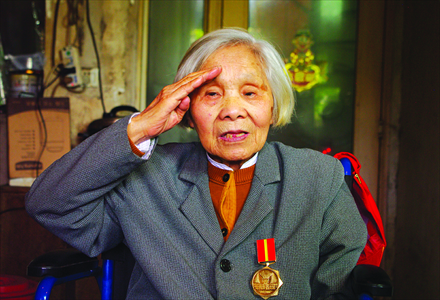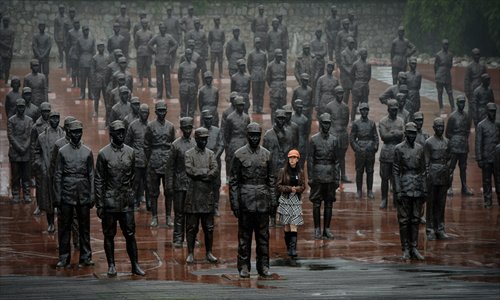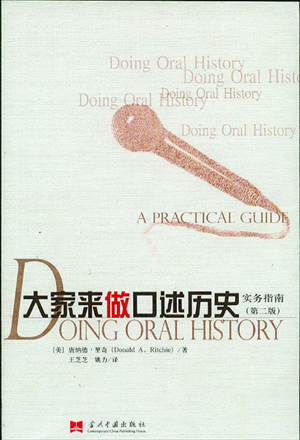HOME >> METRO BEIJING
History retold
By Zhang Zihan Source:Global Times Published: 2013-7-1 20:18:01

Amateur historians are using voice recorders to preserve first-person accounts of history.Photo: IC

Zheng Miao was one of only a few women who served in the KMT army during the war. Photo: Courtesy of Meng Qiping

Visitors walk among statues at a War of Resistance against Japanese Aggression (1937-1945) memorial at the Jianchuan Museum in Chengdu, Sichuan Province. Photo: IC

Doing Oral History,a book published by Contemporary China Publishing House
Liu Dong was born the second child of three, with his elder sister named Hong and his younger brother named Fang. Together, they are "Dong Fang Hong (The East is Red)," the title of a communist anthem which compares Chairman Mao to the rising sun. Needless to say, Liu's family in Changsha, Hunan Province, was very communist and conformist, and firmly believed in official records of history.
"Being brought up in such a family, I used to believe everything written in official history books," Liu told Metropolitan. "But as I gradually developed an interest in history, I found most of these books [I read in school] ... lacked any human accounts of events. Take war as example: official history books quote lots of files and numbers, yet rarely have soldiers' personal experiences."
The dry, lifeless texts motivated Liu to dig deeper. Over the past two years, Liu, a 39-year-old college professor, has become a part-time oral historian, collecting stories from the soldiers of the Kuomintang (KMT) - or National Revolutionary Army during the Republican era (1912-1949) - who fought in the War of Resistance against Japanese Aggression (1937-1945). The experience, he said, "has thoroughly changed my perceptions about Chinese history."
Liu said his research shows that KMT soldiers played a more important role in this war, which undermines the assertions of many official history books which regard the Communist Party as the major contributor to the war effort.
Oral history is enjoying a renaissance worldwide. A new generation of historians seeks to preserve the accounts of those who participated in or observed major historical events. By conducting interviews with people who experienced history, personal testimonies can be preserved for the next generation.
Columbia University historian Allan Nevins established the Columbia Oral History Research Office in 1948, the world's first and largest oral history archive. Other countries like the UK, Germany, Japan and South Africa also have national oral history achieves.
In China, this new emphasis on oral history is providing a fresh new angle to those who are tired of the factually questionable clichés found in the official history records. Here, oral history is mostly preserved by NGOs, individuals and volunteers. The Communication University of China in Beijing, Fudan University in Shanghai and Wenzhou University in Zhejiang Province are among the few academic institutions which have oral history centers.
Telling the whole story
Liu first became interested in collecting spoken history when the texts he was reading in school told a different story from what he'd heard from the elders in his hometown. He wanted to further explore the extent of the KMT army's efforts, so he started recording the personal experiences of his aging neighbors using a digital camcorder.
Liu usually spends a long time searching for interviewees. When meeting up with old soldiers, he brings along his camera and tries to convince them to tell their stories on video.
The filming usually last an hour, though Liu said he always wants to film longer.
"Old soldiers get tired easily, so usually we have to stop after filming for about one hour, and then let them rest,"said Liu. After a little time passes, he goes back for more interview sessions.
Liu has spoken with six subjects so far, including Wang Jinzhu, a 100-year-old KMT soldier and a senior KMT officer who participated in the war against Japan as well as the War of Liberation (1945-1949).
Chen Guohua, a 52-year-old author and newspaper editor, started his own independent oral history research in the early 1990s, and wrote a book about modern Chinese writers' lives during the Cultural Revolution (1966-1976) based on oral history, entitled Ren You Bing, Tian Zhi Fou after a poem by Mao.
For him, oral history helps provide a richer picture. Chen said many official records cover major events, but are written in a way that never hints at the emotional struggles or private lives of the authors.
"Being a writer and reporter, I always have an interest in interviewees' personalities. I'm longing to see more vivid characters, not bland facts," said Chen. "So I visited those writers' friends, relatives, and colleagues and used their quotes to present fuller characters."
East China Normal University history professor Shen Zhihua also takes the approach of incorporating both official and personal stories when conducting historical research.
"Oral history helps to rebuild historical scenes and fill in the gaps," Shen said. "People can understand history better by combining [both] together."
Discovering the forgotten
Liu spoke to Zheng Miao, one of the few female KMT soldiers who participated in the war still living in Changsha. Zheng joined the army in 1937 at the age of 23.
Blind, half deaf and almost paralyzed, Zheng told Liu that for the past decade, she has been living in a dimly lit basement. Its walls are covered with water spots.
Liu connected with Zheng through her alma mater, the Republic of China Military Academy (RCMA). Liu said he will never forget the moment he first saw Zheng.
"She was sitting quietly in a wheelchair against the wall," said Liu. "When Zheng's daughter shouted in a booming voice that people from RCMA Alumni had come to see her, her vitality returned. She grabbed our hands and held them firmly, and asked our names. She can't see, so she tried to feel us." This was no dryly-worded textbook.
During wartime, Zheng worked for the field hospital, writing letters for illiterate soldiers and serving as a nurse when necessary. She met her husband there and gave birth to their son.
The Cultural Revolution robbed Zheng of the dignity she felt as a war veteran. Local mobs destroyed her house and later killed her only son. Her husband was forced to do heavy labor in spite of a wartime injury to his spine.
It was not until recent years when Zheng's stories were discovered by local history researchers that her life gradually improved, yet according to her, there is still no official recognition of her wartime efforts, and she has received no support from local government.
Racing against time
From Jilin Province in the north to Guangzhou Province in the south, concern for oral history is growing in China. Academic researchers and amateur history buffs are starting to write down the stories of elders about various issues like war, literature, art and even kung fu. Over the past few years, many books and documentaries based on oral history have been published.
But all these people are facing one similar enemy: time.
For example, Cui Yongyuan, China's top TV anchor and director of an oral history nonprofit, said at a public seminar that in 2006, his team interviewed 103 soldiers who joined the war against the Japanese and when they returned for follow-up interviews one year later, more than 70 of them had passed away. Of all the 4,000 interviewees they contacted in recent years for CCTV documentary films such as My Anti-Japanese War I & II, more than 1,000 of them have passed away.
Liu has tried to use his footage of old KMT soldiers like Zheng to persuade local media to call out for their welfare, but he's rarely acknowledged. He also tried to upload complaints about unfair treatment of former KMT soldiers onto Internet forums, but not all of them made it through censors.
Even so, Liu said that he wants to do more recordings.
"Some of the soldiers [I met] were paralyzed, some suffered from serious heart disease, but when talking about the war they all became excited: talking loudly, waving their hands. They were so devoted to that war. They deserve recognition," Liu said.
Though Chen was among the few early birds collecting oral history, he often regrets not doing more interviews during the 1990s.
"Too many people have passed, too many witnesses of history," said Chen. "Can you imagine how many secrets they have taken away with them?"
Posted in: Metro Beijing